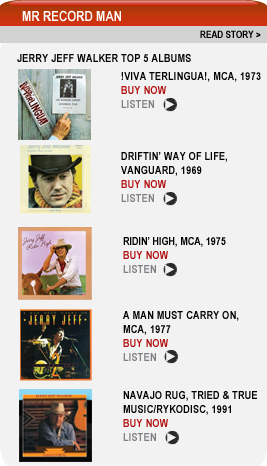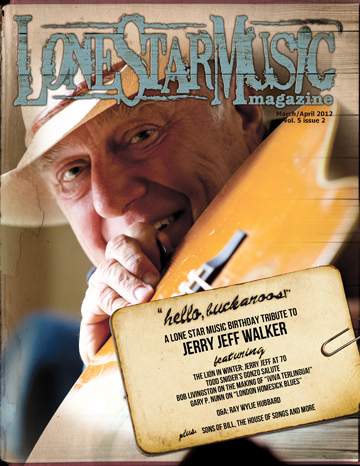

|
Jerry Jeff Walker |
|


January of 1972 was a turning point in my life. Having left the University to pursue the music business full time, the several projects I had attempted had all ended unhappily. I had reached the point of being totally frustrated, and had decided to relocate to the family ranch and do a soul-searching sabbatical and some manual labor and try to focus on what I wanted to do with my life. This was toward the end of 1971.
I had packed and was ready to move when I learned that Michael Murphey was scheduled to play the first week in January at the Saxon Pub, which was then located at 38th ½ Street and I-35, known at that time as the Interregional. Following the closing of Rod Kennedy and Allen Damron’s folksy venue called the Chequered Flag, the Saxon Pub had become the favorite venue in Austin for what was known as the “Coffee House Circuit.” Among the circuit’s popular acts were Damron, Frummox with Steven Fromholz, Three Faces West with Ray Wylie Hubbard, B. W. Stevenson, and Bill and Bonnie Hearne.
I had delayed my departure so that I could catch Michael’s performance that first Monday of 1972. Bob Livingston was playing bass backing up Michael. I listened intently to his first set, and quickly realized why everyone in that circuit held Michael in such high regard. He had written a 22-song country rock concept album called The Ballad of Calico, which had just been recorded by Kenny Rogers and the First Edition. Songs like the title cut, “Waking Up,” and “Harbor for My Soul” were clearly advanced and in my opinion of the caliber of Buffalo Springfield and Simon and Garfunkel, which were my favorites at the time. I was very impressed.
Upon completing his first set, Michael got off the stage and walked directly to me, though we had never met, and said, “I’ve heard a lot about you, how would you like to play bass in my band?” I’m thinking to myself, “This is a whole new ballgame; he’s clearly a very gifted and prolific songwriter, and a soulful singer. He’s working on an LP (that was to become Geronimo’s Cadillac), and has a recording contract with a major label, A&M Records!” I answered without thinking twice that I would be thrilled to play bass in his band. However, at the time he didn’t have a band, but there were some players around that he had some familiarity with and a band quickly formed around him. Eventually it became, besides myself, Craig Hillis, Michael McGeary, Herb Steiner, and Bob Livingston.
Michael completed Geronimo’s Cadillac and I got to sit in on the sessions, play a little piano and organ. I was on Cloud Nine. A&M Records put him on the road to promote it, and we toured the East Coast, playing Philadelphia, New York, Boston, and various college towns with large student populations as well as larger venues in Texas like McFarland Auditorium on the SMU campus in Dallas and, more importantly, the ARMADILLO WORLD HEADQUARTERS! This was a major step up from the smaller listening rooms like Castle Creek, but more importantly it was the first time that someone who was not a nationally known “rock ’n’ roll” act was booked to play the Armadillo!
I would be remiss in telling this story if I didn’t mention the fact that during this year of 1972, while we were technically Michael Murphey’s band, Jerry Jeff Walker had moved to Austin. He had used us to record his first Texas record, simply titled Jerry Jeff Walker. Also, Jerry Jeff had an uncanny knack at booking himself as the opening act at Michael’s shows. In reverse, many times it would be Jerry Jeff’s show and Michael was booked as opening act. Consequently, the band would back up both of them. It went along like this throughout 1972 and things were starting to happen. In early ’73, Michael was scheduled to go back to Nashville to record his second LP for A&M, his Cosmic Cowboy Souvenir album. In preparation for that record, we had rehearsed for six weeks at Bob’s house out on Horseshoe Bend on Lake Travis. There was a problem, though, and that was that Michael had surgery on his vocal cords and was forbidden to speak during this period. He was writing songs on paper and in his head and he would come to rehearsal and peck them out on the piano. Bob would “grok” what he had in mind and do the vocals during that rehearsal period.
We went to Nashville and recorded the record in two days at Ray Stevens Studio. After those sessions the band went back to Texas and went on the road with Jerry Jeff as his record was beginning to get some notice. I stayed with Michael and we worked on overdubs and finished up the album.
In March of 1973, Michael had signed on with the European worldwide label, EMI Records, and they wanted him to come to England to do promotions in the U.K. for Cosmic Cowboy Souvenir. This is when he invited me to go to England with him, which I happily accepted. It was the thrill of a lifetime to have the opportunity to go overseas. It was Michael, his British-born wife, Diana, their 3-year-old son, Ryan, and me. Diana’s mom and dad lived in the Midlands of England, and her brother lived in a fashionable two-story flat near Oxford Street and Hyde Park in London. We did some press receptions. The Eagles were in London promoting their Desperado LP. We were walking past the Royal Albert Hall one day and walked in the backstage area just so, and ran into Don Henley, who we both knew from his days in Texas. Don came by the press reception and sat in on drums as we did our showcase for the British press. I have a little Kodak photo of that somewhere in my stuff.
We were scheduled to be in England for a month, then travel to Holland and France before returning to Texas. Michael was attending one promo function after another, all of which did not require my presence. He had arranged for me to “crash” on the couch in Diana’s brother’s fashionable flat. It was a four bedroom flat with a two-story layout. There were four young men who lived there: Diana’s brother, a stock broker; another English chap; a fellow from Switzerland; and an American from El Paso studying at the London School Of Economics. They were all very nice and hospitable to me. However, they didn’t spend much time at home, nor did they keep food there. I had virtually no money and I spent most of my days in that flat watching horse racing and chilling out, literally, because the heat in that flat went off at 6 a.m. and came back on at 6 p.m. I had a little gut-string guitar with me and I was walking about the living room, looking out on the park below. It was a typical foggy, drizzly, and cold London day. The words that came out of my mouth were, “well it’s cold over here, and I swear, I wished they would turn the heat on.”
That’s where it started. I “fancied,” just to pass the time, that I would make up a tune; just an exercise in writing, the purpose being to mix British phrases and Texas phrases. Thus came lines like, “London Bridge has fallen down, and moved to Arizona, now I know why”; “you can put up your dukes, or you can bet your boots”; “those Limey eyes, were eying the prize, some people call manly footwear;“ “when a Texan fancies that he’ll take his chances” and so on. With these phrases I had something to work with so I just played around with it and put it together. I had plenty of time and nothing to do but “go down to Marble Arch Station.” Of course, the chorus was a no brainer once I had, “I wanna go home with the armadillos.” I debated with myself whether to say, “I wanna go home to the Armadillo.” I think most people thought that’s the way it was anyway. When you’re writing you have these debates with yourself. Sometimes you wish you had done it differently after it’s recorded and too late to change. Then you live with it.
Back in Texas the spring and summer passed. I ran into Jerry Jeff at Tim O’Connor’s first bar in Austin, called the Squeeze In, a tiny little place on 19th Street. about where Guadalupe Street meets what is now called MLK Blvd. Jerry Jeff was going on about how he wanted to make a record in Luckenbach, Texas, which at the time I had never heard of. He asked me if I would come down and play some piano or something. I said sure. I went down there. I think Bob Livingston in his article in this same issue (page 48) describes very well that weeklong recording session in the Luckenbach Dancehall. It was very unconventional but exactly the kind of atmosphere Jerry Jeff wanted to record in. It turned out great, and there’s lots of magic on that recording. On Saturday night of that week, we threw a concert and charged $1.00 a head. That’s the sign on the cover of the ¡Viva Terlingua! LP. The place was packed to the max. Late in that show, Jerry Jeff looked over at me at said, “do that song you were singing under the trees this afternoon.” I did.
The crowd went nuts! The tape was rolling. The rest is history!
